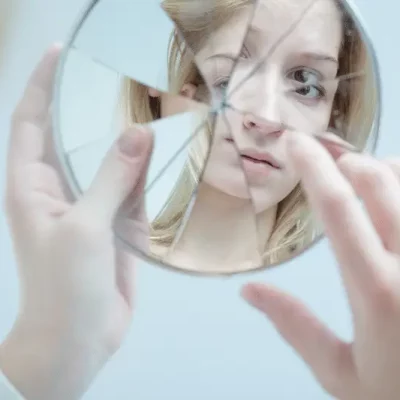When the mirror becomes a dreaded enemy, and your reflection distorts into something unrecognizable, you might be dealing with Body Dysmorphic Disorder (BDD). It’s not just about being self-conscious or having low self-esteem; BDD goes far deeper. In this comprehensive guide, we will explore the causes, symptoms, and potential cures for this challenging condition that can make you feel trapped in a relentless battle with your own image.
“I didn’t need someone to tell me I was beautiful. I needed someone to listen to why I felt that way in the first place.” – Anonymous Quote from a Makin Wellness Patient
What is Body Dysmorphic Disorder (BDD)?
Body Dysmorphic Disorder, often referred to as BDD, is a mental health condition characterized by a relentless fixation on a perceived flaw in your appearance. Individuals with BDD spend several hours a day obsessing over this perceived flaw, leading to heightened anxiety levels. This intense preoccupation can result in social isolation, making it challenging to engage in everyday activities such as family obligations, work, or school.
Who Does BDD Affect?
Body dysmorphia directly affects approximately 2% of the general population. While this may seem like a relatively small number, it translates to 1 in 50 people. In reality, this means that if you’re not personally experiencing BDD, you likely know someone who has or is currently struggling with it. While BDD often emerges during adolescence when our bodies undergo significant changes, adults can also be affected.
What Causes Body Dysmorphia?
The specific cause of Body Dysmorphic Disorder remains unknown, as many mental health conditions result from a complex interplay of genetic, environmental, and predispositional factors. However, certain factors may increase your risk of developing BDD:
- Family History: A family history of body dysmorphia or similar conditions like Obsessive-Compulsive Disorder (OCD).
- Neurological Factors: Differences in brain structure or function.
- Personality Types: Certain personality traits, such as perfectionism.
- Childhood Experiences: Negative childhood experiences like teasing, neglect, or abuse.
- Societal Pressure: Societal standards of beauty and unrealistic body ideals.
- Coexisting Mental Health Conditions: Having another mental health condition, such as anxiety or depression, can contribute to the development or exacerbation of BDD.
Recognizing Symptoms of Body Dysmorphic Disorder (BDD)
Identifying BDD can be challenging, as individuals with the condition often go to great lengths to conceal their symptoms. However, some common signs and behaviors in individuals with BDD include:
- Obsession with a perceived flaw in their appearance
- A strong belief that this perceived defect makes them ugly or deformed.
- Conviction that others take special notice of their appearance in a negative way.
- Engaging in behaviors aimed at fixing or concealing the perceived flaw, which are difficult to resist or control, such as frequent mirror checking.
- Attempts to hide perceived flaws with makeup, clothing, or styling.
- Frequent comparisons of their appearance to others.
- Seeking reassurance from others about their appearance.
- Perfectionism in their appearance.
- Pursuing cosmetic procedures without finding satisfaction.
- Avoiding social situations due to the above symptoms.
Can Body Dysmorphic Disorder Be Treated?
The simple answer is yes, Body Dysmorphic Disorder can be treated and managed effectively. While the road to recovery may be long, you are undoubtedly worth the journey.
Seeking Help for BDD
The path to recovery from BDD varies for each individual. Acknowledging the issue is the first step, and you’ve already taken it by reading this blog. Often, BDD is accompanied by underlying conditions like mood disorders, anxiety, or eating disorders. In some cases, Obsessive-Compulsive Disorder (OCD) may also play a significant role. While this doesn’t mean you’re “crazy,” it does suggest that addressing these underlying issues can be crucial for your overall well-being.
The Fork in the Road
The next step involves deciding whether counseling is the right path for you. Every journey is unique, but here are some essential points to keep in mind:
- You Are Not Alone: Many individuals have successfully overcome BDD with professional help.
- Treatment Is Essential: BDD typically does not resolve on its own and often requires long-term care to prevent relapse.
- Complex Symptoms: Symptoms of BDD can overlap with other psychological issues, making an accurate diagnosis crucial. For instance, feelings of guilt and shame caused by BDD might be mistaken for the behavioral symptoms of social anxiety. Therefore, it’s recommended to seek assistance from a qualified mental health professional if you suspect you or someone you know is struggling with BDD.
Who Can Help You?
Body dysmorphia therapists like Rahmah Albugami at Makin Wellness in Pittsburgh specialize in addressing the complexities of BDD. They work diligently to uncover the underlying factors contributing to the distressing thoughts that can haunt those with BDD. Using proven therapeutic methods tailored to your unique needs, your therapy plan will create a safe space where you can begin to feel comfortable in your own skin once more.
Remember: You Are More Than Your Reflection
Eating disorders are complex conditions often accompanied by various physical and mental health issues. These serious conditions require appropriate care. If you or someone you love is struggling with Body Dysmorphic Disorder, please consider sharing this post and reaching out to a Makin Wellness counselor at (833)-274-heal.
Body Dysmorphic Disorder Conclusion
Body Dysmorphic Disorder can be an incredibly isolating condition, but you don’t have to face it alone. Help and support are available, and with the right guidance, you can regain control over your life. Whether you’re seeking therapy or exploring other forms of treatment, remember that you are more than your appearance. You deserve to live a life where you feel good about yourself and your body.








This Post Has 2 Comments
I am curious about thoughts of looking at one’s body and feeling disgust e.g. seeing a picture of one’s self and seeing how overweight one is, or that a shirt is untucked and a bit of stomach is showing, these feelings of disgust and self-loathing, rejection arise. the self-hatred. so it’s not really focusing say on one’s nose or a mole and seeing imperfection, it’s about the disgust with one’s self. Is that body dysmorphia?
Thank you for reaching out. These thought patterns can be part of body dysmorphia If you are dealing with any of these thoughts and need any support, reach out to a Makin Wellness therapist. We would be happy to help you!